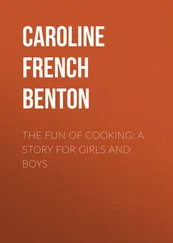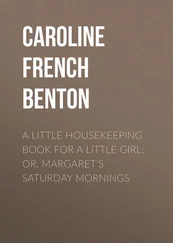Caroline Benton - Living on a Little
Здесь есть возможность читать онлайн «Caroline Benton - Living on a Little» — ознакомительный отрывок электронной книги совершенно бесплатно, а после прочтения отрывка купить полную версию. В некоторых случаях можно слушать аудио, скачать через торрент в формате fb2 и присутствует краткое содержание. Жанр: foreign_antique, foreign_prose, на английском языке. Описание произведения, (предисловие) а так же отзывы посетителей доступны на портале библиотеки ЛибКат.
- Название:Living on a Little
- Автор:
- Жанр:
- Год:неизвестен
- ISBN:нет данных
- Рейтинг книги:4 / 5. Голосов: 1
-
Избранное:Добавить в избранное
- Отзывы:
-
Ваша оценка:
- 80
- 1
- 2
- 3
- 4
- 5
Living on a Little: краткое содержание, описание и аннотация
Предлагаем к чтению аннотацию, описание, краткое содержание или предисловие (зависит от того, что написал сам автор книги «Living on a Little»). Если вы не нашли необходимую информацию о книге — напишите в комментариях, мы постараемся отыскать её.
Living on a Little — читать онлайн ознакомительный отрывок
Ниже представлен текст книги, разбитый по страницам. Система сохранения места последней прочитанной страницы, позволяет с удобством читать онлайн бесплатно книгу «Living on a Little», без необходимости каждый раз заново искать на чём Вы остановились. Поставьте закладку, и сможете в любой момент перейти на страницу, на которой закончили чтение.
Интервал:
Закладка:
"Suppose you get three pounds of lamb stew one day, which is too much for a single meal; you cook it all, take out the large bones and put them over for soup, and serve half the meat for dinner. The second night you have the other half in a meat pie, with any gravy you do not need you put in the stock-pot. Now, incidentally, let me say that sometimes lamb is expensive, so do not rush madly off when you market and invest largely in it because I said it was cheap. Always watch the price and buy only when things are low in price.
"You see this is the way I plan: I make a point of buying enough meat for two dinners at one time, because one large purchase costs less and goes farther than two smaller ones. You can buy a pound and a half of chopped beef and make two meals of it for less than you can buy one pound one day and a second pound the next, and that is what you would do, practically, if you bought each day."
"But I am sure Fred would not like Hamburg steak twice running, Mary."
"He need not have it. I buy the two days' supply at once, say the steak on Monday; I serve half that night in one fashion; Tuesday night I have something quite different, perhaps veal; Wednesday night we have the rest of the steak in another way from the way we had it Monday night, and Thursday night we finish up the veal, also in a different way from the Tuesday night style. That gives variety, and a man cannot keep count of these things in spite of his alleged mathematical mind, so it works perfectly."
"Suppose you don't get enough for two nights, or the man eats more than you expected he would and you are short, what do you do then?"
"I manage, my dear. If I have a good deal of meat left over from the first day's dinner I have perhaps English rissoles; or I have a nice dish of baked hash; or a cottage loaf; or I have a meat pie.
"If I run short and have only a little meat, as you suggest, I have a soufflé, which takes only a cup of chopped meat for a good-sized dishful. I'll give you the rule for that. Or, I have croquettes; they are one of the queer dishes apparently out of place at dinner, but they are good and make a change, and when you have only a little meat they are invaluable. You see what I mean. Plan to get enough meat for two dinners at once, and if you are short on the second night, have a little dish of left-overs, disguised."
"But do you think croquettes would be enough dinner for a hungry man? I have an idea they would be considered as a sort of appetizer only."
"Of course they would not be enough; what an idea! You have forgotten soup. Always have a course of distinctly heavy soup when you are to have a light meal, and vice versa. With corned beef you can have a thin stock, clear; but with croquettes have a rich, substantial bean soup or split pea purée, and have solid vegetables with the meat and a good dessert. All those things may be cheap and not bring up your bills at all, and still you can keep down that dreadful item we housekeepers all must struggle with, – meat."
"And do you have fish on Fridays?"
"Yes, I have fish occasionally, for a change, but I am careful to buy that which has little waste. Large, whole fishes for baking are expensive, for the head and tail have to come off, you see. I get codfish steaks or sometimes a little halibut; neither of those has any waste at all. Or, if there were a river near by, or a lake, I should find out what they caught there and buy that. One day I have the fish as it comes from market, baked or fried, or otherwise prepared; the next day I have the remains scalloped with crumbs and baked. Sometimes I have them in cream sauce, baked in the same way. Once in awhile I get a can of salmon in the place of fresh fish and use it in exactly the same way; and when the exchequer gets very low indeed, I take salt codfish and freshen it and cream and bake it, and invariably Dick compliments me on the extremely good halibut I have!"
"Absurd! But to go on: tell me about the vegetables and salads and desserts that you have."
"I can't do it all at once, my dear; you are so energetic! We will take a special lesson on each of those important things as we come to them. Just now I am laying down principles, you see, and I was speaking of courses at dinner when you diverted me with your questions, just as a pupil when she is not prepared does to a teacher. But perhaps you have my idea, and I can stop here."
"Yes, I think I understand. Have a heavy soup when you have a light course to follow; have a light soup with a heavy meat; have vegetables with the meat and dessert last; is that all?"
"Often I have meat and vegetables first and then salad next; always in summer, I think. It is the best way in hot weather. But have three courses, – that is the economic point I am striving for, – and have coffee last, if you can. Men love coffee for dinner, and if it is black and only a little is taken, it is considered a digestive; and, like other things, it helps out."
"Think of the dishes you are piling up for me to wash in the morning, Mary!"
"Not at all. Only a poor cook ever has piles of dishes to wash up. Wash up all your cooking utensils as you go along. When you have finished with anything, even a bowl or spoon, take it to the sink, wash, wipe, and put it away; it takes no more steps to do it then than it will later. After dinner at night there should be only the few dishes actually in use on the table; if, possibly, you cannot manage to wash up your broiler or frying-pan because you use them at the last minute, and also because they are too greasy to handle in your nice gown, put these in a special dish-pan all by themselves, with hot water and washing-powder, and stand this out of the way till morning; so much is allowable."
"Is that all for to-day?" Dolly inquired, seeing her sister preparing to do some cooking.
"Yes, that is all, and though you may not think it amounts to much, you will see more in the lesson when you come to keep house than you do now. If you always are neat and look attractive, if you always serve a delightful course dinner for a minimum sum, and have a pretty table, you will be far on your way toward being the perfect housewife."
"I wish I were at the end now," murmured Dolly.
"Then you would lose half the fun of life, my dear. The interest of your studies grows the farther you get along, as I have told you before. Long before you know it all you will be sighing for more worlds to conquer." Dolly looked unconvinced, but her sister laughed at her sober face.
"Mark my words, before you are a finished housekeeper you will love your work!"
CHAPTER IV
Soups and Meats
"When I came to look over what you said about soups and meats the other day," Dolly complained at the next lesson, "I found it was all glittering generalities. I didn't have a thing written down under soups but 'beans' and 'split peas,' and as to meats, it was mostly don'ts or left-overs. Now, before you go off on anything else, suppose you tell me a lot more about these things."
"So I will. Perhaps I did generalize a bit, but I do not always realize that you do not know how to use a cook-book yet; if you did you could look up all these things for yourself.
"To begin with soups, then, like 'all Gaul,' they are divided into three parts.' There are soups made with vegetables and water and nothing else; soups made with a foundation of meat and bones; and milk-and-vegetable soups. The first kind is the cheapest, and we will start there.
"There are any number of good things to make these soups of, principally beans, – black, white, red, and Lima beans, all dried. You must soak them, cook them slowly in another water, season well with a slice of onion, salt, and pepper, and put them, when they are soft and pulpy, through the sieve. What is called a purée sieve is the best, because it is made in such a way that it presses the vegetables through itself. Then you must thicken the soup with a little bit of butter melted and rubbed with flour; this is not because it is not thickened with the vegetables already, but because the water will separate from the rest if no extra thickening is used. You can have the soup rather thin to make it just right after it is thickened.
Читать дальшеИнтервал:
Закладка:
Похожие книги на «Living on a Little»
Представляем Вашему вниманию похожие книги на «Living on a Little» списком для выбора. Мы отобрали схожую по названию и смыслу литературу в надежде предоставить читателям больше вариантов отыскать новые, интересные, ещё непрочитанные произведения.
Обсуждение, отзывы о книге «Living on a Little» и просто собственные мнения читателей. Оставьте ваши комментарии, напишите, что Вы думаете о произведении, его смысле или главных героях. Укажите что конкретно понравилось, а что нет, и почему Вы так считаете.












